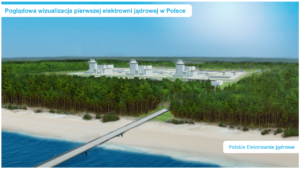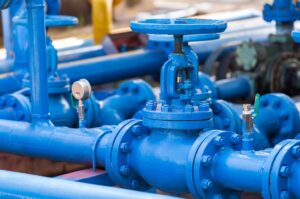Delaying Nord Stream 2 is not enough to ensure Ukraine’s stability. The Russians have already begun playing for its destabilization during and after the parliamentary elections. Warsaw should act in the face of the interregnum in Brussels, writes Wojciech Jakóbik, editor-in-chief of BiznesAlert.pl.
Pressure on Russia
Danish Politiken writes that the delay in the construction of the contested Nord Stream 2 gas pipeline by Denmark will improve Ukraine’s negotiating position in talks on the future supply of Russian gas through its territory.
– We owe a lot of thanks to Denmark. It is quite clear that Denmark is an example for other European countries. It is a country that does not afraid to stick to European values despite the strong pressure from Russia and even Germany – said Yuriy Vitrenko, manager of Naftogaz, during the seminar on Nord Stream 2 in Oslo.
Naftogaz is a Ukrainian gas company that participates in the tripartite process, i.e. talks with Ukraine, Russia and the European Commission on the future of gas supplies through Ukrainian territory after 2019, when the current transmission contract ends and the Nord Stream 2 gas pipeline is to be completed by from Russia across the Baltic Sea to Germany.
The new infrastructure would allow the Russians to leave the Ukrainian route and replace it by German. However, they are still waiting for Denmark’s consent to the location of the section in its territorial waters. After the end of the territorial dispute with Poland, the Danish side asked the pipeline builders to submit a third application for consent, taking into account the new route on the waters delimited by the agreement. That option is the least harmful to the environment, according to the Danish Energy Agency, which is responsible for examining these applications.
The delay of Nord Stream 2 by at least half a year will cause the Russians to threaten the specter of non-compliance with the implementation of supply contracts containing gas collection points defined on the western border of Ukraine. They will therefore need a transmission contract with Kiev. – Gazprom knows that this delay, if the Danish government will lead to it, will mean the need to find as a minimum solution for 2020 – said Witrenko quoted by Politiken. However, the manager claimed that if you accept the first or second application, Nord Stream 2 will have no delay.
As we have repeatedly wrote in Biznesalert.pl, in case of Nord Stream 2 delay, the Russian side may wish to extend the transmission contract with the Ukrainians. In addition, the above-mentioned pipeline will not be able to immediately use the full capacity because of the need to build a branch of the EUGAL Germany, which is to be ready by the end of 2020. The Russians, however, are working intensively to improve the negotiating position.
There is no policy
– We agreed to discuss the date of the next tripartite meeting – Russia-Ukraine-European Commission consultation – in the second half of September. In order to wait for the results of the parliamentary elections in Ukraine, wait for the formation of the government – said Russian Energy Minister Aleksander Nowak quoted by Polish Press Agency after talks with the Deputy Head of the European Commission, EU Energy Commissioner Marosz Szefczovich in Moscow. He assured that in Russia’s actions „there is no policy”.
This is contradicted by Russia’s actions, which work to delay talks with the European Commission, while proposing a bilateral agreement to Ukrainians. Gazprom offered Naftogaz an out-of-court agreement regarding the arbitration dispute over the transmission contract being in effect until the end of 2019. An agreement outside of arbitration would allow, according to Nowak, continuation of supplies by Ukraine under „current conditions”. Perhaps the Russian minister is deliberately delaying talks with the Commission – they are not on his hands, they are setting up a finalization with the implementation of EU legislation in the new transmission contract – to talk bilaterally with Kiev, which may be more compliant after the parliamentary elections.
Gazprom already offers a return of supplies, which the Ukrainians resigned in November 2015. Alternative deliveries from the territory of the European Union, including Poland, are possible thanks to the support of international donors headed by the International Monetary Fund. However, the help program gives the carrot with the stick. The condition for its maintenance is the continuation of reforms, which in the gas sector means the gradual release of previously subsidized gas prices. It evokes social dissatisfaction, which may translate into an increase in support for forces willing to sign a separate agreement with Russia. Oligarch Igor Kolomoisky, associated with President Volodymyr Zełeński, has already argued in the past that Ukraine should give up foreign aid and painful reforms. Until now, the official advisers of the president are against it.
However, pro-Russian forces in the Ukrainian parliament are preparing for elections. It is no coincidence that during the presidential election, Viktor Medvedchuk, at the head of the Opposition Platform – For Life, was invited to Moscow for talks on the conditions of gas supplies to Ukraine. It was a sign that voting for his team could mean ending the dispute with Gazprom, and thus cheaper gas without painful reforms. Perhaps for some electorate the argument about the consequences of returning to dependence on Russia will be secondary.
Miedwiedczuk argues that gas purchased from the European Union is still Russian. He appeared on the panel of the International Economic Forum in St. Petersburg and met again with the Gazprom chairman Alexei Miller. In their opinion, the Russians can offer gas cheaper by 25 percent than the average price of Naftogaz in 2018 in the amount of $ 300 for 1000 cubic meters. by removing customs duties on delivery. Miedwiedczuk together with the former Minister of Energy and the Coal Industry, Yuriy Boyko, argue that the difference between Gazprom’s price and the European offer goes to the „business structures of former President Petro Poroshenko and Prime Minister Volodymyr Hrojman who in their opinion embezzle them with the chairman of Naftogaz Andriy Kobolew. They argue that Ukrainians should bring Russian gas using the help of private companies, which should not look at the bad – in their opinion – state policy. It is worth recalling that both critics of Ukraine’s cooperation with the European Union are on target of the Security Service of Ukraine for their visit to the Moscow headquarters of Gazprom.
Interregnum and lessons for Poland
Earlier parliamentary elections in Ukraine can take place on July 21. In the course of the campaign and after it should be expected the Russia’s intense efforts to persuade Ukrainian society to abandon reforms and choose a political force that will guarantee stabilization in relations with the Russians at the expense of breaking cooperation with Western institutions. All this will happen during the interregnum in the European Commission, whose new composition can only be selected in autumn. It is possible that the new hand will lack the position of Vice-President for Energy Union currently held by Marosz Szefczovicz. Passing the supervision over the tripartite process can be time-consuming. For this reason, the importance of an active policy of European Union member states to maintain gas reform in Ukraine is growing. Poland may be more strongly involved in the promotion of this cooperation, having arguments for maintaining it in the form of a PGNiG contract for gas supplies over the Dnieper from ERU Trading and prospects for the development of exports from its territory, for example under the contract with Naftogaz.








